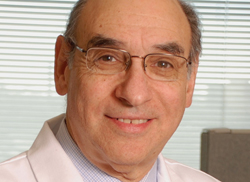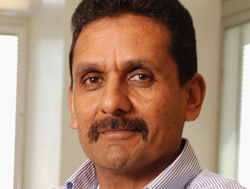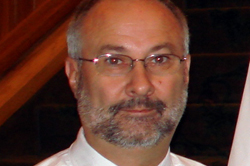 |
Irving Zucker, Ph.D. |
 |
Kaushik Patel, Ph.D. |
 |
Harold Schultz, Ph.D. |
The grant’s director is Irving H. Zucker, Ph.D., chairman of the department of cellular and integrative physiology.
The grant was was first awarded by the National Heart, Lung, and Blood Institute — a division of the National Institutes of Health (NIH) — in 1999 and has been renewed twice.
“Dr. Zucker’s outstanding leadership of a world-class team is a model for the best practice in the complex world of 21st century science,” said Tom Rosenquist, Ph.D., vice chancellor for research. “His scientific innovation, energy and productivity have made him a leading international figure in cardiovascular physiology and one of three UNMC Scientist Laureates.
“I predict we will be discussing the next renewal of the project in five years.”
UNMC researchers whose projects will benefit from the grant are:
- Dr. Zucker — In his work, Dr. Zucker focuses on how exercise training can reduce levels of a molecule — called angiotensin II — that plays a key role in heart failure;
- Kaushik Patel, Ph.D., professor of cellular and integrative physiology — Dr. Patel focuses on nitric oxide mechanisms in an area of the brain known as the Paraventricular Nucleus (PVN). He has shown these mechanisms malfunction during heart failure. His work also shows that exercise training or gene therapy improves the nitric oxide mechanisms within the PVN, which lessons the autonomic complications of heart failure; and
- Harold Schultz, Ph.D., professor of cellular and integrative physiology — Dr. Schultz’s work focuses on the chemoreflex function, which has been shown to be exaggerated in heart failure. This exaggeration contributes not only to altered breathing but to elevated sympathetic nerve activity, which damages the failing heart.
The grant also provides funds for three core facilities and the following co-investigators:
- Kurtis Cornish, Ph.D., professor of cellular and integrative physiology; core director;
- Shyamal K. Roy, Ph.D., professor of obstetrics and gynecology and cellular and integrative physiology; director of the molecular biology core
- Lie Gao, Ph.D., assistant professor of cellular and integrative physiology;
- Wei Wang, Ph.D., associate professor of cellular and integrative physiology;
- Hong Zheng, M.D., assistant professor of cellular and integrative physiology;
- Yu-long Li, M.D., assistant professor of emergency medicine; and
- Matthew Zimmerman, Ph.D., assistant professor of cellular and integrative physiology.
Over the past 10 years, Dr. Zucker said technical support has also been provided by several dedicated personnel including:
- Researcher Johnnie Hackley;
- Research technologist Pamela Curry;
- Research technologist Mary Ann Zink;
- Research technologist Phyllis Anding;
- Research technologist Xuefei Liu, M.D.;
and
- Research technologist Pamela Curry;
- Research technologist Lirong Xu, Ph.D.
In heart failure, the heart cannot pump enough blood throughout the body. The NIH reports that about 5 million people in the United States have heart failure and the condition is the main cause of hospital admission for patients older than 65 years old.
The condition causes or contributes to about 300,000 deaths annually in the United States.
“We are excited by the NIH’s continued support of our research,” Dr. Zucker said. “I’m grateful for the continued hard work and commitment by the members of our team in our work to confront heart failure.”